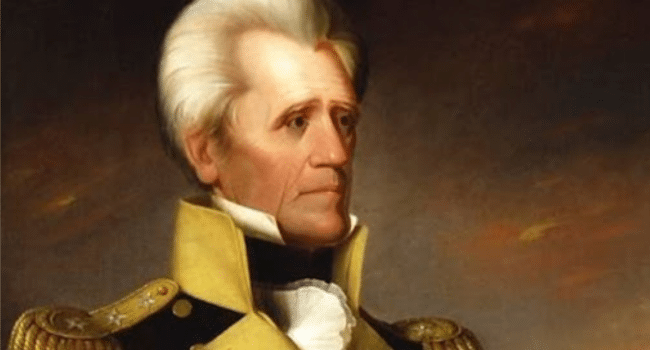Table of Contents
Every Veterans Day, America pauses to honor those who have defended the nation. Among the early patriots who shaped the United States, few lived a life as intense and complicated as Andrew Jackson. The seventh President of the United States is usually remembered as the hero of the Battle of New Orleans or the populist who challenged Washington’s political elite. But the deeper story of his life—filled with youthful defiance, battlefield courage, and political audacity—offers powerful lessons about the cost of freedom and the duty to protect it for future generations.
A Teenage Prisoner of War
Jackson’s lifelong commitment to independence began well before he entered politics. In 1781, at just thirteen, he volunteered as a courier for American militia forces in the Revolutionary War. Captured by British soldiers, he was ordered to polish a British officer’s boots. Jackson refused. The officer struck him with a saber, leaving gashes on his head and hand. Those scars never faded, physically or emotionally. He carried a deep, personal hatred of British imperialism into adulthood, shaping his decisions as a general and as president. For Veterans Day, his story serves as a reminder that the defense of freedom often begins with ordinary citizens—sometimes even children—who refuse to submit to oppression.
Family Built by Choice, Not Blood
Although Andrew and Rachel Jackson never had children of their own, their home was never empty. They adopted a Creek Indian orphan named Lyncoya, raised Rachel’s nephews, and served as guardians to several other relatives. This side of Jackson’s life rarely makes the history books, but it reveals a quieter dedication to responsibility and care. While his presidential policies toward Native Americans were tragically harsh, his decision to raise a Native child shows a more complex personal dimension. It challenges us to think about how personal compassion and public policy can diverge—and how both shape the next generation.
A Warrior Who Wouldn’t Back Down
Jackson’s nickname, “Old Hickory,” captured his toughness. He fought in more than a dozen duels, often to defend the honor of his wife or his own reputation. In one 1806 duel he took a bullet to the chest that surgeons never removed; he lived with it for decades. His fearless nature surfaced again in 1835, when an assassin confronted him outside the U.S. Capitol. Both of the assailant’s pistols misfired. Instead of retreating, the 67-year-old president charged the attacker and struck him repeatedly with a cane until others intervened. Jackson’s instinct to confront danger head-on speaks to the grit and resolve that define American veterans to this day.
Military Leadership that Saved a Young Nation
Jackson’s rise to national fame came during the War of 1812. In the legendary Battle of New Orleans in January 1815, he commanded a diverse force—regular U.S. soldiers, local militia, free Black troops, frontiersmen, and even pirates—against a better-equipped British army. Against long odds, his strategy and relentless discipline produced a stunning victory that secured American control of the Mississippi River and boosted national confidence. Even though the peace treaty ending the war had already been signed in Europe, the victory convinced the world that the United States was capable of defending its independence. It also cemented Jackson’s reputation as a military hero and protector of American sovereignty.
Fiscal Discipline and Political Upheaval
As president (1829–1837), Jackson brought the same intensity to economic policy. He became the only U.S. president to pay off the national debt, a milestone unmatched before or since. His refusal to renew the charter of the Second Bank of the United States reshaped the nation’s financial system, weakening centralized banking but also triggering the speculative bubble that led to the Panic of 1837. For modern readers, his economic legacy is a cautionary tale: bold action can solve immediate problems but also create long-term instability.
A Complicated Record on Freedom
Veterans Day invites honest reflection, and Jackson’s record demands it. His Indian Removal Act of 1830 forced tens of thousands of Native Americans from their ancestral lands, causing immense suffering along what became known as the Trail of Tears. Remembering Jackson truthfully means recognizing both his service and his policies’ consequences. Patriotism is not blind admiration; it is the commitment to learn from history and to ensure that freedom and justice expand rather than contract.
Enduring Influence on American Politics
Jackson pioneered a populist style of politics that resonates even today. He cast himself as the champion of the “common man” against entrenched elites, reshaping the presidency into a stronger, more direct voice of the people. His campaigns energized voters and helped create the modern Democratic Party. Whether one applauds or critiques his methods, the “Age of Jackson” redefined the relationship between citizens and their government and proved that political engagement is itself a battlefield where freedom is defended.
Lessons for Today’s Guardians of Liberty
From a teenage prisoner of war to a general who defended New Orleans and a president who stood down assassins, Andrew Jackson’s life is a testament to relentless determination. He showed that freedom is not an inheritance; it is a responsibility renewed in every generation. His courage under fire, his willingness to adopt and protect children in need, and even his missteps offer guidance. They challenge Americans to pair bravery with justice, and to act with both resolve and foresight.
As we honor veterans on November 11, Jackson’s story calls on us to do more than remember. It urges us to support today’s service members and their families, to guard civil liberties, and to stay alert to threats—foreign or domestic—that could erode what earlier generations fought to secure. Freedom, as Jackson’s life demonstrates, is never free and never permanent.
